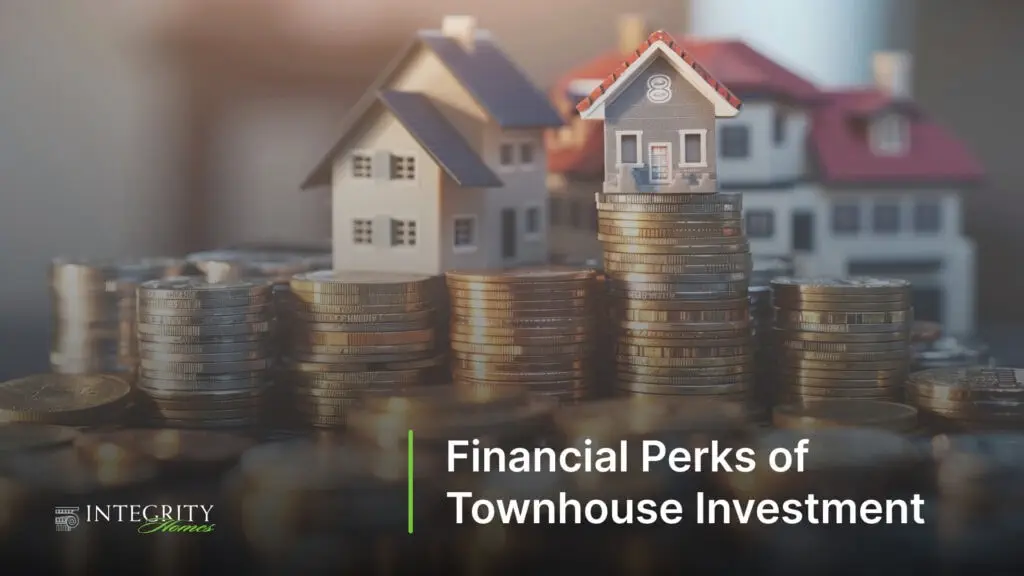
Why townhomes are a good investment? For those entering the real estate market, townhomes offer an attractive balance of affordability and income-generation potential. This article strips away the excess, focusing squarely on the pragmatics of investing in townhomes: their financial benefits, growth in popularity, and how they compare within the property landscape. You’ll gain insights into why townhomes are a good investment as a distinct and practical investment choice, without sales pitches or unnecessary exaggerations.

Townhomes are becoming increasingly popular in the real estate market, providing a fruitful investment for many investors. Their affordability and accessibility make them a popular choice among first-time entrants in the rental property market. Investing in a townhome is often less daunting than investing in a single-family home due to their lower down payment requirements and more manageable size. This positions townhomes as a favorable starting point for investors with less capital, and townhome investments townhomes represent a smart choice for those looking to enter the market.
Townhome ownership usually encompasses both inside and outside spaces, offering a harmonious balance between seclusion and communal living. This unique blend of urban living and traditional charm, along with desirable amenities and community-centric lifestyle, is hard to find in single-family homes or condos. However, it’s not all rosy; the potential challenges, such as less privacy and HOA fees, should not be overlooked. Yet, these do not detract from the significant benefits in terms of diversification and the rich community amenities provided.
The affordability of townhomes is one of their most attractive features, especially when compared to single-family homes. This reduced cost attracts a wide range of renters, including newcomers to the real estate market, positioning townhomes as a viable investment for those seeking to establish themselves in the real estate sector. Furthermore, the affordability of renting a townhome remains lower than the cost of owning a similar-sized home in most of the U.S., further increasing their attractiveness and rental appeal.
Townhomes are often located in urban areas, providing accessibility to city amenities that modern home seekers desire. This accessibility, combined with the affordability, is creating a strong trend of renters and investors alike gaining momentum towards townhomes. Consequently, there is a noticeable trend of a varied rental market moving towards townhomes, significantly enhancing their rental allure.
One of the key features distinguishing townhomes as an investment property is their potential to generate consistent rental income. The equilibrium between cost-effectiveness and space in townhomes draws in a substantial pool of potential renters, which could result in a greater investment return. From young professionals to small families, townhomes cater to a broad demographic, suggesting a reliable income stream for investors.
The dynamic housing market and strong market trends are also contributing to the consistent rental income from townhomes. As property investment becomes more popular, today’s real estate market sees townhomes as a good investment, yielding positive cash flow from rental income after covering expenses. Hence, fostering healthy relationships between landlords and tenants is vital for steady rental income and robust investment performance.
Apart from generating rental income, another critical aspect of any good investment property is the potential for appreciation. Factors such as:
can significantly impact townhome property values. These factors considerably enhance the value of townhome properties for the property owner.
Townhomes provide higher resale value due to desirable amenities and lower property tax rates compared to single-family homes. Furthermore, the value of townhomes tends to increase faster than that of single-family homes. However, real estate investors should be mindful of future trends, such as alterations in office space usage, the probability of prolonged high-interest rates, and the possible stabilization of inflation rates, which may affect the appreciation prospects of townhomes.

Another persuasive argument for townhomes being a solid investment option is the variety of financial advantages they provide. Townhomes a good investment, as townhome owners generally enjoy tax deductions, incentives, and operational efficiency through HOA management, which can boost their investment performance. Ongoing expenses for townhome investments include interior maintenance and property taxes, which vary by location. However, these costs are often offset by the benefits, making townhomes a viable option for your next investment property.
It’s essential to remember that each investment carries its own unique risks. For townhomes, one of the key factors that affect profitability is the HOA fees. While these fees contribute to operational efficiency, unexpected assessments from the HOA for extensive repairs or replacements can affect the overall returns on investment. Therefore, a thorough market research and understanding of HOA fees and services are crucial when considering townhomes as an investment.
One of the substantial financial benefits of investing in townhouses is the possibility of tax deductions and incentives. Property taxes paid on a townhouse may be deducted up to $10,000 for married couples filing jointly or $5,000 for single filers. Moreover, mortgage interest on townhouses can be deducted up to a limit of $750,000 for joint filers.
In addition, the following expenses related to owning a rental property can be deducted from taxable income:
These deductions can significantly offset the costs associated with owning a rental property and boost the overall return on investment, considering both rental income and other financial gains. Utilizing property management software can further streamline the process.
The Homeowners Association (HOA) enhances the operational efficiency of townhome investments. HOA fees cover various services such as:
Paying into these costs helps reduce insurance costs for townhome owners, as these are often shared with multiple units within the complex.
However, it’s important to bear in mind that townhome owners may also face unexpected assessments from the HOA for extensive repairs or replacements. These unexpected expenditures can impact the total investment returns. Therefore, understanding the scope and limitations of HOA fees and services is crucial in assessing the profitability of townhome investments.

After examining the advantages and potential risks of townhome investments, we should now focus on the rental market scenario for townhomes. A variety of elements, including rental demand trends and tenant preferences, shape the rental market for townhomes. Rental prices in the U.S. have risen by 30% from pre-pandemic levels, with an average increase of 3.6% over the past year. This trend enhances the profitability of townhomes, making them a key consideration in the dynamic housing market.
The rental vacancy rate has stabilized at 6.6% for the last quarter of 2023, returning to pre-pandemic levels. Larger metro areas are reporting lower rental vacancy rates, indicating a tighter housing supply. These trends suggest that townhomes are increasingly sought after, thanks to their balance between affordability and space, and their appeal to a diverse rental market.
The robust demand for rental properties is sustained by young adults who remain in the rental market longer while saving for house down payments. This trend, along with demographic changes indicating a rise in the number of young adults and specific groups such as singles, younger generations, and racial or ethnic minorities remaining in the rental market for extended periods, boosts the demand for townhomes.
Renting is anticipated to be more economical than buying in 2024, positioning townhomes as an appealing rental option. Moreover, rental prices are escalating in most major metro areas, primarily due to inflation, inventory shortages, and changes in the workforce. This trend, coupled with the fact that townhomes situated in prime locations, such as near colleges or public transport routes, can command higher rents, signifying favorable investment spots. These factors contribute to the rental demand dynamics, making townhomes a lucrative investment property in the current real estate market.
Tenant preferences play a significant role in shaping the rental market landscape for townhomes. Changing preferences and lifestyle choices, such as a trend towards multi-generational living, have made townhomes a more desirable option in the rental market. Community amenities like swimming pools, tennis courts, and a sense of community make townhomes attractive.
Moreover, prospective tenants consider local neighborhood factors such as the crime rate, school district, and available amenities when choosing a townhome. Tenants favor neighborhoods that match their lifestyles, such as those close to schools for families or robust in restaurants and nightlife for young professionals. Comprehending these tenant preferences can aid investors in customizing their offerings to fulfill market demands and optimize their rental allure.

Navigating relationships with Homeowners Associations (HOAs) is an important aspect of townhome investments. HOAs manage the neighborhood or community, ensure the upkeep of common areas, and enforce rules that contribute to maintaining a high standard of living. Understanding the benefits of HOA oversight and the fees and services they provide can help investors make more informed decisions and better manage their investments.
Nonetheless, before investing in a townhome, investors must carefully read and comprehend the HOA’s rules and regulations to ensure they align with investment objectives. These rules play a critical role in maintaining high community standards, ensuring that the properties adhere to a certain level of upkeep and aesthetic uniformity, which can enhance the appeal for potential buyers and contribute to increased property values over time.
HOA rules and regulations are pivotal in upholding high community standards, guaranteeing that the properties maintain a certain level of care and aesthetic consistency. These enforced community standards can lead to an enhanced appeal for potential buyers, thereby contributing to increased property values over time.
Although HOA restrictions on rental conditions might curtail some facets of property profitability, they also safeguard the quality and reputation of the community, which can be a worthwhile trade-off for long-term investment value. Thus, part of the allure of townhome investments lies in the benefits of HOA oversight, which helps maintain community standards and boost property values.
HOA fees typically cover access to shared amenities such as pools, tennis courts, gyms, and include services like pest control. Regular HOA fees help maintain the attractiveness and upkeep of the community, which can be a positive aspect for investors when analyzing monthly costs and rental income prospects.
Nonetheless, investors should stay alert to potential special assessments that might emerge due to unexpected community expenses, which could impact the total profitability of the investment. Therefore, understanding the scope and limitations of HOA fees and services is crucial in assessing the profitability of townhome investments.

One of the key features distinguishing townhomes as a sound investment property is their strategic location selection. A property’s location significantly influences its value, demand, and growth potential, making it a crucial aspect in real estate investment. Factors such as neighborhood potential, accessibility, and proximity to key amenities can greatly affect a property’s resale value and its appeal to renters.
Conducting a comprehensive area analysis that evaluates the economic, employment, educational, and ecological aspects of a location can offer insights into strategic real estate investments. Hence, when considering investing in townhomes, it’s important to examine market trends and gauge the effects of future developments on property values.
Analyzing the local economy, including business growth, employment rates, and public amenities, is critical for identifying strong market trends. A comprehensive understanding of real estate market trends should include factors such as days on the market, rental prices, cash-on-cash return, property taxes, and multifamily rental inventory relative to single-family homes. By considering these factors, one can gain valuable rental market insights.
Assessing market trends also requires analyzing property sector performance, availability of equity for acquisitions, and the impact that high interest rates have on property prices and transaction volumes. Therefore, investing in properties located in desirable areas, utilizing specialized financial tools, is likely to result in faster appreciation of the property’s value over time.
Future development plans can significantly influence the long-term value and demand for townhome properties. Upcoming zoning changes, local business developments, and shifts in government policies can have important implications for property values and the viability of townhome investments.
As a real estate investor, staying informed about these future developments can help you make more strategic investment decisions. By understanding how these prospective changes can impact property values, you can better position your investments to capitalize on these trends and enhance your overall investment performance.

To make an informed decision about investing in townhomes, it’s important to understand how they fit into the broader real estate context. Compared to other property types, townhomes offer a unique blend of features that can make them an attractive investment option. They typically involve owning both the structure and the land it is on, providing added community security but possibly reducing privacy.
On the other hand, condos are generally preferred for their lower maintenance responsibilities, though they often come with less privacy and no land ownership. Thus, discerning the differences between townhomes, condos, and single-family homes can enable investors to ascertain which property type aligns best with their investment objectives and risk tolerance.
Comparing townhomes to other property types can provide valuable insights for investors. Townhomes often result in lower utility bills and maintenance costs compared to single-family homes. However, the value of single-family homes tends to appreciate at a higher rate than that of townhomes.
On the other hand, compared to condos, townhouses usually offer more privacy as they often do not have neighbors above or below and may come with a small yard. By understanding these comparisons, investors can make more informed decisions about which property type best suits their investment strategy.
Although townhomes present several advantages, it’s equally important to take into account potential investment risks. Single-family homes typically have higher appreciation rates compared to townhomes, which has led to a historical perception of them being better long-term investments. However, factors such as market trends, location, and future developments can significantly influence the appreciation prospects of townhomes.
Therefore, when considering townhomes as an investment, it’s crucial to conduct thorough market research, consider various investment risks, and develop a comprehensive investment strategy. This can help you maximize your investment performance and ensure a steady flow of rental income.
Throughout this guide, we’ve explored the potential of townhomes as a valuable investment opportunity. We’ve discussed the allure of townhome investments, the financial perks that they offer, and the dynamics of the rental market landscape for townhomes. We’ve also delved into the importance of understanding HOA relationships, the significance of strategic location selection, and the broader real estate context.
Investing in townhomes can offer unique advantages, including affordability, consistent rental income, and appreciation prospects. However, like any investment, it’s crucial to conduct thorough research, consider potential risks, and align your investment strategy with your financial goals. With careful planning and strategic decision-making, townhomes can be a lucrative addition to your real estate investment portfolio.
Investing in townhomes is a great option due to their affordability, accessibility, and community living, which can provide steady rental income and potential property value appreciation. Consider these factors when making your investment decision.
Investing in townhomes can offer financial perks such as potential tax deductions, HOA management efficiency, and consistent rental income. These can contribute to a successful investment strategy.
Understanding rental demand dynamics and tenant preferences can help investors tailor townhome offerings to maximize rental appeal and meet market demands.
The HOA plays a crucial role in maintaining the neighborhood, overseeing common areas, and enforcing community rules to uphold a high standard of living for townhome investors. Understanding the benefits, fees, and services provided by the HOA can help investors manage their investments effectively.
Townhomes often have lower utility bills and maintenance costs compared to single-family homes, and they may offer more privacy compared to condos due to having no neighbors above or below and possibly having a small yard.
Maryland | Frederick, MD | National Harbor, MD | Potomac, MD
Virginia | Alexandria, VA | Fairfax, VA | Lorton, VA | Northern, VA | Stafford, VA | Stephenson, VA | Winchester, VA | Washington DC